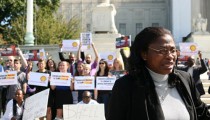Amnesty International, which is supporting the case, has independently assessed and believes that Shell encouraged the authorities in their campaign to stop the protests, even after it knew they were committing human rights violations. The women are seeking compensation and an apology from Shell.
Taking a powerful multinational to court is an agonizingly long process. Because of the impossibility of achieving justice in Nigeria, Esther first brought a case against Shell in the US in 2002 but the case was dismissed in 2015 on jurisdictional grounds. The new case was brought in Shell’s home jurisdiction of the Netherlands, but there were more obstacles in store. In September 2017 Shell’s US law firm refused to hand over more than 100,000 internal documents crucial to Esther’s case – Given the seriousness of the allegations, it is vital that Shell releases the rest of the information.
“I need the truth to be heard,” says Esther. “l will continue fighting even if it takes my last breath – to see my husband exonerated for a crime he did not commit.”
What’s especially disturbing is that, more than two decades after these traumatic events, Shell’s operations are still polluting Ogoniland. Earlier this year groundbreaking research by Amnesty International found that the company is still failing to respond quickly enough to reports of oil spills, leaving some to go unchecked for months on end. The organization also found evidence that Shell blames some spills on sabotage to avoid paying compensation to affected communities.
Esther fled Nigeria in 1996 and sought asylum in the United States, but says her friends and family in Nigeria are still suffering from Shell’s pollution. “All the land, and water that we use for fishing, it is all polluted. People are dying; young people, the old, children. Shell has the money but it refuses to clean up,” she says.
Instead of committing to proper clean-ups, Shell concentrates time and resources into fighting a raft of legal battles relating to its irresponsible practices all over the world. There are currently more than 50 lawsuits pending against Shell, relating to its involvement in historic human rights abuses, corruption and environmental destruction. Plaintiffs from the Philippines to Nigeria to the US are determined to see Shell brought to justice for the harm it has caused in the name of profit.
Shell denies responsibility in all these cases. Esther believes that, despite its denials, Shell is fully aware of the extent of the damage it has caused.
“Shell has the money to suppress the voice of the people,” she says. “They should come and face us in court. If they did nothing they should come out and face us in court…What is Shell hiding? I want the world to know what Shell did and to see them face justice.”
Esther hopes to bring an end to decades of impunity for Shell. Though the process is slow, she says she has been given strength by the thousands of Amnesty International activists from around the world who took action for her, sending messages of solidarity and signing a petition demanding justice.
“Amnesty International and other human rights activists gave me and my family the reason to live again. Knowing that people like Amnesty are fighting for me makes me happy,” she said.
“I appreciate [activists] for all they have been doing for us. I ask you to continue the good work, to stand by us and help us to fight for the injustice that is happening to our people.”
Esther is still waiting to see her case with Shell go to court. Her 22-year battle for justice continues.
*Shell stated that Amnesty International’s allegations relating to its current operations are false, without merit and fail to recognise the complex environment in which it operates. Shell also refutes the allegations that it supported the Nigerian military crackdown in Ogoniland in the 1990s, stating that it: “did not collude with the military authorities to suppress community unrest and in no way encouraged or advocated any act of violence in Nigeria.”
Source: AmnestryInternational

